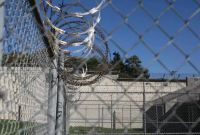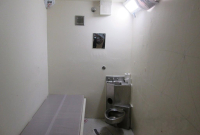Support strong Canadian climate journalism for 2025
A civil liberties group that has launched a constitutional challenge to Canada's segregation laws told a Toronto court today that the rule of law must be brought into the country's correctional system.
Canadian Civil Liberties Association lawyer Jonathan Lisis says the federal government's practice of administrative segregation is unconstitutional and a key statute requires a rewrite to protect inmates from harm.
The CCLA argues that the practice of administrative segregation amounts to indefinite solitary confinement, and has submitted evidence of several inmates who were kept isolated for years.
Lisis argues the statute is flawed because it does not take into account harm against an inmate that is subject to solitary confinement.
He says there is consensus among a wide variety of Canadian medical organizations that such a practice causes harm as early as 48 hours that includes psychosis, hallucination, depression, anxiety and suicide.
In July, an Ontario court rejected the federal government's attempt to delay the challenge because parliament had proposed legislation to address the issues.
"The statute does not require to turn its mind to the impact on the inmate or the reasons for the isolation," Lisis told court.
Two years ago, the CCLA and the Canadian Association of Elizabeth Fry Societies launched the constitutional challenge, arguing the practice is harmful, amounts to cruel and unusual punishment, and means offenders are effectively punished more than once for the same crime.
The CCLA wants any administrative segregation stay to be limited to 15 consecutive days and never for an inmate with a mental illness or a young person.
In response to the challenge, and a similar one pending in British Columbia, the Liberal government introduced Bill C-56 several months ago. The bill would limit administrative segregation to 21 days — a limit that would fall to 15 days 18 months after the legislation took effect.
The hearing is expected to last all week.





Comments